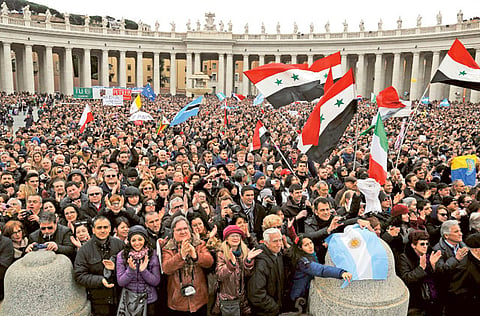‘Pray for me’, Pope Francis urges at first Angelus
More than 150,000 pilgrims massed in St Peter’s Square for pope's first Angelus prayer

Vatican City: Pope Francis appeared before some 150,000 pilgrims massed in St Peter’s Square on Sunday for his first Angelus prayer and asked the faithful to pray for him.
“Thank you for your welcome, and for your prayers,” the first pope from Latin America said from a window of the papal apartment high above the square. “Pray for me,” he added.
Breaking with tradition, Pope Francis delivered off-the-cuff remarks about God’s power to forgive instead of reading from a written speech for the first Sunday window appearance of his papacy.
He also spoke only in Italian — beginning with “buon giorno” (good day) and ending with “buon pranzo” (Have a good lunch) — instead of greeting the faithful in several languages as his last few predecessors had done.
His comments and humour delighted the crowd in St Peter’s Square, drawing cheers and laughter.
In just five days, Francis’ straightforward, spontaneous style has become immediate hallmark of his papacy.
Earlier Sunday, he made an impromptu appearance before the public from a side gate of the Vatican, startling passers-by and prompting cheers, before delivering a six minute homily — brief by church standards — at the Vatican’s tiny parish church.
Before he entered St Anna’s church to celebrate Mass, he heartily shook hands with parishioners and kissed babies.
After Mass, Francis put his security detail to the test as he waded into the street just outside St Anna’s Gate. As the traffic light at the intersection turned green, Francis stepped up to the crowd, grasping outstretched hands. The atmosphere was so casual that several people even gripped Francis on the shoulder.
Dozens of flags from Francis’ native Argentina were waving in the square, along with the Vatican’s yellow and white standard, as the former cardinal Jorge Mario Bergoglio recited the traditional Sunday Angelus prayer, the first of his papacy.
Gabriel Solis, 33, an Argentine pilgrim, spoke of his “indescribable emotion”.
“He will bring much peace because he seems more humble, more spontaneous,” he said. “He seems closer to the people. We didn’t feel that with the pope we had before.”
The Angelus has traditionally been a moment to comment on international issues, but Francis instead used the occasion to emphasise his Italian roots.
The former Buenos Aires archbishop, whose parents hailed from Italy, said he chose to name himself after St Francis of Assisi because of his “spiritual ties with this land”.
A million people may attend the pope’s inauguration mass on Tuesday, including world leaders who are set to begin flying into Rome on Sunday.
Among them is Argentine President Cristina Kirchner who had tense relations with Bergoglio, the former archbishop of Buenos Aires, before his elevation to pope.
US Vice-President Joe Biden was also due to arrive later on Sunday.
Francis, whose Italian father was a railway worker, has already spoken to Catholic leaders about the need for spiritual renewal and evangelisation and cautioned them against worldly glories, as well as calling for a “poor Church” that should be closer to ordinary people.
He warned cardinals that the Church would fall apart “like a sand castle” if it did not have a solid spiritual foundation and urged them to share their wisdom — “good wine that gets better over the years” — with young people.
At the same time, Francis has faced accusations at home that he failed at the time to speak out against brutalities committed during the years of the military junta in Argentina (1976-1983) when he was head of the country’s Jesuits.
The Vatican has firmly rejected claims that Bergoglio failed to intervene when two Jesuit priests were tortured by the dictatorship, saying the allegations were part of a leftist, anti-clerical campaign.
The Argentine judge who investigated the case, German Castelli, also came out in support of the pope on Saturday, saying that prosecutors had found that Bergoglio had “no case to answer”.
But the Grandmothers of the Plaza de Mayo organisation, founded to help locate children who were kidnapped during the military era, lambasted the new pope.
“He has never spoken of the problem of people who had disappeared under dictatorial rule,” said Estela Carlotto, the head of the group, whose daughter Laura was abducted and killed.
Francis is a moderate conservative who is unlikely to change key doctrine but experts say that he could push for more social justice and a friendlier faith.
Vatican watchers are keeping a close eye on nominations to top posts as an indication of what changes in substance his papacy could herald.
Francis will meet next Saturday with Benedict, the first pope to stand down since the Middle Ages.
The resignation brought to an abrupt end a troubled eight-year papacy that was often overshadowed by scandals including the denunciations of hushed-up sexual abuse of children by paedophile priests stretching back decades.


